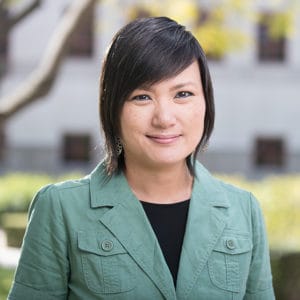Faculty
-

Joshua Goode
Professor of Cultural Studies and History
Chair, Cultural Studies DepartmentResearch Interests
Modern Spain, 19th- and 20th-century Europe, Genocide and racial thought, Museums and commemoration, Memory
-

Romeo Guzmán
Assistant Professor of History
Research Interests
Citizenship, Migration, Sport, Public history, Digital humanities
-

JoAnna Poblete
Professor of History
John D. and Lillian Maguire Distinguished Professor in the Humanities
Chair, History DepartmentResearch Interests
Colonialism and empire, unincorporated territories, migration and labor, comparative ethnic studies, Asian-American and Pacific Islander studies, 20th-century United States, indigenous issues, environmental history, oral history, U.S. expansionism
Curriculum
Courses
Required History courses (4 units)
- History 300 (4 units)
Archival Studies courses (12 units)
- Archival Studies 310: Introduction (4 units)
- Archival Studies 311: Topics & Advanced Training (4 units)
- Archival Studies 396: Internship/Practicum (4 units)
History elective courses (28 units)
Open elective courses (4 units)
Research Tools Requirement
- One language–reading proficiency in historical materials (European studies requires French or German)
Research Paper
- One substantive research paper
Thesis
An original scholarly work written in consultation with a Thesis Committee and based on an array of primary and secondary sources.
Internship
You can gain professional experience in the field through a required internship in archives or special collections at numerous institutions in the L.A. region, including:
- Iranian American Women Foundation
- Orange County Museum of Art
- LACMA Curatorial and Collections
- Claremont Heritage
- Collections Internships at the Wende Museum
- Intern Position for the Journal of the American Academy of Religion
Application Guidelines
| University Requirements | |
|---|---|
| Application Fee | $80 (fee is non-refundable) |
| Official Transcripts | Undergraduate/graduate |
| English Proficiency Exam | Required (international applicants only) |
| Resume | Applicants must submit an up-to-date copy of their resume. |
| Program Requirements | |
|---|---|
| Statement of Purpose | Please submit a 2-3 page statement of purpose that details your academic and/or professional achievements, your specific areas of research interest within your desired field of study, why you are a strong candidate for graduate studies at CGU, and your career goals. |
| Letter of Recommendation | 3 letters required |
| Standardized Test Scores | GRE (optional) |
| Writing Sample | All applicants are required to submit a writing sample of previous work in addition to the statement of purpose. You may submit samples of any length you feel indicate your writing ability, but please note that we will be unable to return any items submitted as part of your application (please, no books). Most applicants submit one or two scholarly papers or excerpts of around 10-15 pages. Writing samples should not exceed 30 pages. |
Key Dates & Deadlines
CGU operates on a priority deadline cycle. Applicants are strongly encouraged to submit complete applications by the priority dates in order to assure maximum consideration for both admission and fellowships.
Once the priority deadlines have passed, the University will continue to review applications for qualified candidates on a competitive, space-available basis. The final deadlines listed are the last date the University can accept an application in order to allow sufficient time to complete the admissions, financial aid, and other enrollment processes.
Spring 2025
Priority Deadline – November 1, 2024
Final Deadline (International) – November 15, 2024
Final Deadline (Domestic) – December 1, 2024
Classes begin – January 21, 2025
Fall 2025
Priority Deadline – February 1, 2025
Final Deadline (International) – July 5, 2025
Final Deadline (Domestic) – August 1, 2025
Classes begin – August 25, 2025
Cost & Aid
ESTIMATED TUITION (CALIFORNIA RESIDENTS, NON-RESIDENTS, INTERNATIONAL)
| Program | 48 units |
| Tuition per unit* | $2,020 |
*Based on 2024-2025 tuition rates.
STUDENT FEES (PER SEMESTER)
| $245 Student Fee |
| $150 Technology Fee |
| International Student Services Fee*: $661 fall semester, $776 spring semester **Applies to all international students (F-1 visa only) who are registered in coursework, doctoral study, or continuous registration. The fee is assessed each fall and spring semester for annual ISO accident and sickness plans and administrative fees. Subject to change. |
For estimates of room & board, books, etc., please download CGU’s Cost of Attendance 2024-2025.